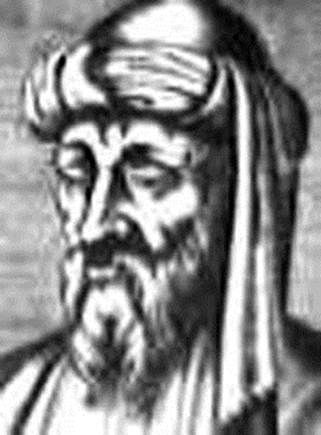
Porphyry Malchus
 المؤلف:
T L Heath
المؤلف:
T L Heath
 المصدر:
A history of Greek mathematics I, II
المصدر:
A history of Greek mathematics I, II
 الجزء والصفحة:
...
الجزء والصفحة:
...
 20-10-2015
20-10-2015
 1370
1370
Born: 233 in Tyre (now Sur, Lebanon)
Died: 309 in Rome
 Porphyry's father was called Malkhos or Malchus, which means 'king'. Both Porphyry's parents were Syrian and he would only get the nickname Porphyry later in his life as we shall explain below. Porphyry was named after his father so for many years he was known as Malchus.
Porphyry's father was called Malkhos or Malchus, which means 'king'. Both Porphyry's parents were Syrian and he would only get the nickname Porphyry later in his life as we shall explain below. Porphyry was named after his father so for many years he was known as Malchus.
As a young man Porphyry tried to gain as broad a knowledge as he possibly could by studying many languages and religions. At that time Athens was the main centre for learning, so it was natural that someone with a thirst for knowledge as Porphyry had should travel there to continue his studies. In Athens Porphyry became a student of Longinus who [8]:-
... was a 'living library and walking museum' and the academic's critical attention to detail, clarity of style and erudition left their permanent mark on the keen student.
It was Longinus who gave Porphyry that nickname. In fact it was a clever pun since 'Porphyry' means 'purple' in Greek and he was given this name since he came from Tyre which was famous for the production of the royal purple dye and his name 'Malchus' meant 'king' = 'royal' = 'purple'.
In about 263 Porphyry left Athens and went to Rome where he worked with Plotinus, the founder of Neoplatonism. Plotinus taught that there is an ultimate reality which is beyond the reach of thought or language. The object of life was to aim at this ultimate reality which could never be precisely described. Plotinus stressed that people did not have the mental capacity to fully understand both the ultimate reality itself or the consequences of its existence.
Porphyry had mixed feelings when he heard the teachings of Plotinus. On the one hand he came to appreciate the point of view that Plotinus was putting forward, although it was somewhat different from the views of Longinus. However Porphyry was very disappointed in the way that Plotinus expressed himself and he found Plotinus's lectures poorly structured and his arguments rather woolly.
Porphyry spent five years in Rome with Plotinus and during this time he [2]:-
... tried to rouse in the master the ambition to organise his doctrines.
It is not entirely clear why Porphyry left Rome but there does seem to have been disputes over doctrine between the philosophers who formed Plotinus's circle. Porphyry went to Sicily where he wrote a text bringing the philosophies of Aristotle and Plato together. Porphyry had a strong respect for the views of Aristotle and further work by Porphyry at this time led to a revival in studies of the works of Aristotle. In particular his commentary on Aristotle's Categories led to the later developments of logic. It would appear that Porphyry's views on Aristotle had something to do with the disputes in Plotinus's school which had led to the break-up.
Also while Porphyry was in Sicily, he wrote a work on vegetarianism and a critical work against Christian doctrines. Porphyry did not break his links with Plotinus, however, and he continued to correspond with him on presenting his views in the most coherent fashion.
According to Heath [5] Porphyry was:-
The disciple of Plotinus and the reviser and editor of his works.
Despite the fact that Porphyry's views were not completely at one with those of Plotinus, this description by Heath is a fair one. Porphyry certainly did go on to edit the works of Plotinus, for he returned to Rome in about 282 (which was about 12 years after Plotinus died). There he continued to write commentaries on Plato and other philosophers but mainly he continued the major work of his life which was to edit and publish Enneads on the teachings of Plotinus which he had completed about 301.
Also while in Rome Porphyry taught Iamblichus who was another important developer of Neoplatonism. However, Iamblichus developed his views away from those of Plotinus and soon found himself disagreeing with Porphyry.
We should make some comments as to the importance of Porphyry in the history of mathematics. He wrote a commentary on Euclid's Elements which was used by Pappus when he wrote his own commentary. Proclus appears to have Porphyry's original comments to hand when he wrote his own commentary. This is a point on which it is impossible to be certain for there is a slight possibility that all Proclus knew about Porphyry's commentary was what Pappus had written.
Another important contribution made by Porphyry was in writing his Life of Pythagoras. Certain important fragments of other mathematician's writings have also been preserved in the works of Porphyry including Nicomachus and Eudemus.
- Biography in Encyclopaedia Britannica.
http://www.britannica.com/eb/article-9060889/Porphyry
Books:
- A H Armstrong (trs.), Porphyry, Life of Plotinus (Cambridge, MA, 1966).
- C Evangeliou, Aristotle's categories anf Porphyry (Leiden, 1988).
- P Hadot, Porphyre et Victorinus (Paris, 1968).
- T L Heath, A history of Greek mathematics I, II (Oxford, 1931).
- A Smith, Porphyry's place in the Neoplatonic tradition (The Hague, 1974).
- P V Spade (ed.), Porphyry the Phoenician, Boethius, Abelard, Peter, Duns Scotus, John, William of Ockham : Five texts on the mediaeval problem of universals : Porphyry, Boethius, Abelard, Duns Scotus, Ockham (Indianapolis, IN, 1994).
Articles:
- E Craig (ed.), Routledge Encyclopedia of Philosophy 7 (London-New York, 1998), 545-550.
- M J Edwards, Porphyry and the intelligible triad, J. Hellenic Studies 110 (1990), 14-25.
 الاكثر قراءة في 500AD
الاكثر قراءة في 500AD
 اخر الاخبار
اخر الاخبار
اخبار العتبة العباسية المقدسة


